#Moon さよならを教えて
Explore tagged Tumblr posts
Text
I suppose many of us have that one song that makes us miss Acchan terribly. For me it's Moon Sayonara wo Oshiete. 😿
#I cannot listen to it without grieving#buck-tick#b-t#Moon さよならを教えて#b-t fan rambling#(I read translation of the lyrics just moment ago. It didn't exactly help. 😢)#atsushi sakurai#sakurai atsushi#sakurai
12 notes
·
View notes
Text
🌃
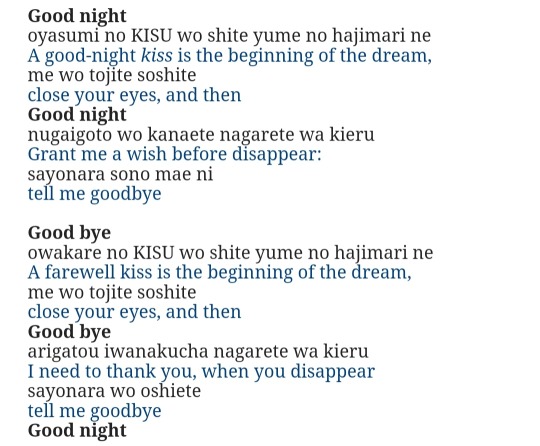
Under the Moon Light
Good morning Darling Hello Good-bye
🙂🥲😭
#buck-tick#buck tick#atsushi sakurai#No.0#rest in peace#moon sayonara wo oshiete#Moon さよならを教えて#Spotify
23 notes
·
View notes
Text
Why fandom decided that Laito had sex with Cordelia?
My position: they never had sex. Bloodsucking only. Not without a certain reason. I would like to prove that claimimg they were sexual lovers is not correct at all.
Watching the anime only and without any accompanying sources you might not even guess any sex. However the fact that Laito was in love and desired his own mother is obvious. In s01e04 he sighs glaring at the moon remembering the smell, the voice of his beloved' swears eternal love to her; in s01e08 he having pushed his mother off the balcony said that now she belongs only to him forever; in s01e11 he expresses regret that he doesn't see her in hell, and in s01e12 while her dressburning he mumbles something about her (maybe Karl's also but due to contex it must be about Cordelia) and Richter's actions to them.
s01e04:




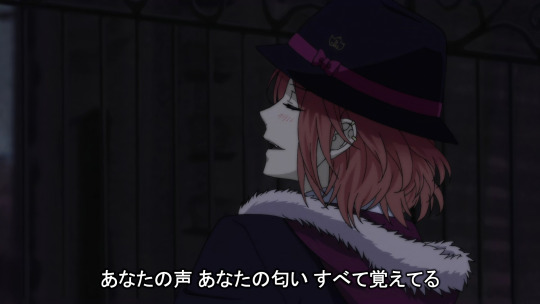
愛してます. いつまでも いつまでも いつまでも. あなたが望むと望まざるとにかかわらず. 一瞬たりとも あなたのこと忘れたことなんかない. あなたの声 あなたの匂い すべて覚えてる. Laito: I love you. Always, always, forever. Whether you want it or not. I've never forgotten you for a moment. Your voice, your smell, I remember everything.
s01e08:
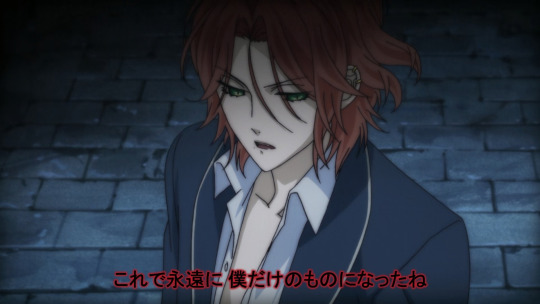
これで永遠に僕だけのものになったね Laito: Now you belong to me only forever.
s01e11:

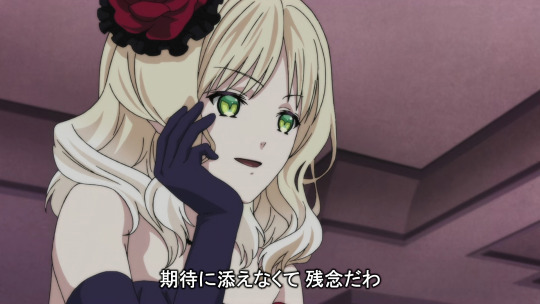

次に会う時は地獄だと思ってたよ Laito: I thought the next time we met would be in hell. 期待に添えなくて、残念だわ Yuidelia: It's a shame it didn't live up to expectations. いや 期待以上だよ Laito: No, it's beyond expectations.
s01e12:


一つだけ明らかな真実を教えてあげるよ Laito: I'll tell you the only obvious truth. 僕たちはもう二度と叔父上やあの人に振り回されない Laito: That person and you, Uncle, will never be able to wield us again.
Cordelia in s01e08 asked Laito to save her and, holding out her bloody hand, said that she truly loved him:

ライト 私を助けなさい Cordelia: Laito, save me.
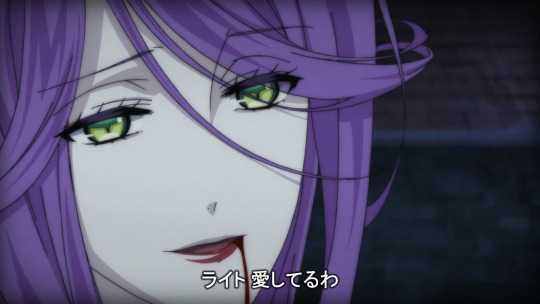

ライト 愛してるわ Cordelia: Laito, I love you. 本当に Cordelia: Really.
And that's the whole story of their relationship in anime.
Unlike Ayato who was thrown into the lake in s01e02 and said to live at the its' bottom in s01e07 Laito seems having no reason to hate his mother but the fact that he desired her is an indisputable (his 'you're mine forever').
No official source desribed it as sexual relationship. Never.
This was only thought up by the fans themselves.
Analyzing DL keep in mind key aspects that important to understand the story:
1. the title is based on a bloodsucking fetish: bloodish is a much more intimate process than simply eating, it's erotic; 2. Laito and others are demonic creatures with a distorted nature, they don't feel like humans and have no human heart; 3. DL women are weak fisicallly and magically; 4. Cordelia's blood and even its' smell drove vampires crazy.
In the first game there are only two oddy episodes that fans automatically saw as sex.
1. DL Laito Dark Epilogue. Laito has a dream of Cordelia coming to him: she says that she is 'not enough' and that she 'loves' him, he promises to 'give her love'. 2. DL Laito Maniac Epilogue. After killing some man Cordelia asks Laito to give her 'warmth'.
The rest flashbacks do not hint at anything at all. Imprisonment in a dungeon (DL Laito Maniac Prologue) and a request to help killing Karlheinz (DL Laito Ecstasy Prologue), Cordelia's murder (DL Laito Ecstasy Epilogue).
But inside Yui Cordelia called her son a 奴隷. It seems to be a special term, we would return to it.
That made fans decide that the mother sex with her own son. If Laito and Cordelia would be human, not bloodsucking demons, I would agree with fans. But from the start I passed the games I noticed many details in Laito's logic that were not that simple.
We have a blood-drinking fetish. Cordelia had special blood. So this story may be more complicated.
More, Blood. There are only two flashbacks with Laito and Cordelia. Dark Prologue and Ecstasy Epilogue. In MB Dark Prologue Laito asks Cordelia in bedroom 'why doing such a thing'. Cordelia answers because she loves him and what a place in a world where any mother doesn't love her child. Laito answers that's 'here'.
Fans again decide that Laito is hinting at sexualized 'love' between him and his mother.
In MB Dark Epilogue and MB Ecstasy Prologue the butler of their castle invited Laito to Cordelia. Laito provocatively asked the reason. To the butler's unfinished answer Laito only grinned and called him a 'bad old man'.
In MB Ecstasy Prologue Ayato tried to hammer into his brother that Cordelia didn't love any of them.
MB Dark Prologue, MB Dark Epilogue, MB Maniac Epilogue are episodes which his relationship with the maid Hilde are shown as he decided to use words of love for his own purposes and to seduce her. His monologues also are hardly grasp their essence, it is often unclear who Laito is talking about - himself, someone or in general.
Dark Fate. Laito refused to acknowledge Cordelia as his mother but Richter scolded him for this. Yui wanted a solution to this problem.
DF Laito Maniac Epilogue. Laito himself suggested to his mother to forget about 'that person' because she already 'has him'. Cordelia snapped that Laito is not Karlheinz and is not a replacement of him. And her answer really affected him ('If not a replacement who am I?')
DF Laito Vampire End. Laito having already learned about his father's experiments makes a grave for Cordelia, calls her 'kaa-san' for the first time and says goodbye to her.
In SS for the Dark Fate game he again refers to her 'kaa-san': 'Ayato and Kanato have mom's blood, so they would be okay' (true-sweet-moments).
Lost Eden. Laito only remembers Cordelia once comparing her to Yui whom he suspects of cheating on Kino (LE Laito Ecstasy Prologue).
Lunatic Parade. Yui stutters about 「裏切り」 = Laito's 'betrayal' by Cordelia in his childhood (LP Laito Chapter 2).
Chaos Lineage. Some episodes with Yui's heartbeat and her avoiding Laito memorizing Cordelia again.
That's all. That made fans thinking Cordelia and Laito had sex.
The CD-drama Versus II Ayato vs Laito even pushed fans to decide that Cordelia raped her son when he was a child. But again Laito's words are not about it.
However I repeat our bloodsucking story with giving blood that means too much and Cordelia's special blood suggests a much more difficult story. So then we would learn all the fanbooks, descriptions, dramas and other characters' (especially Kanato and Ayato) conversations to understand what it was. Sex or bloodsucking only.
160 notes
·
View notes
Text
So, this is a post that probably interests only me and myself, but I just want to write down my thoughts about this page again. I was just rereading volume 39, chapter 345 or 360 depending how you count, titled “Great Gurus" 大導師 for other reasons. [Well, it’s a very revealing chapter when it comes to Berserk influences over Elden Ring]. But I really like this page and how the conversation turns personal in this moment. It’s a rare moment of calm, and perceived safety: Guts has accomplished the goal of bringing Casca to Elfhelm and that is a different kind of accomplishment than winning a battle in a fighting for life and death situation. The way the elders of Elfhelm ask about Griffith is devoid of hatred or rage. It’s curiosity even in the face of great peril: the world as they knew it is changing and they won’t have a place in the new world that is coming.
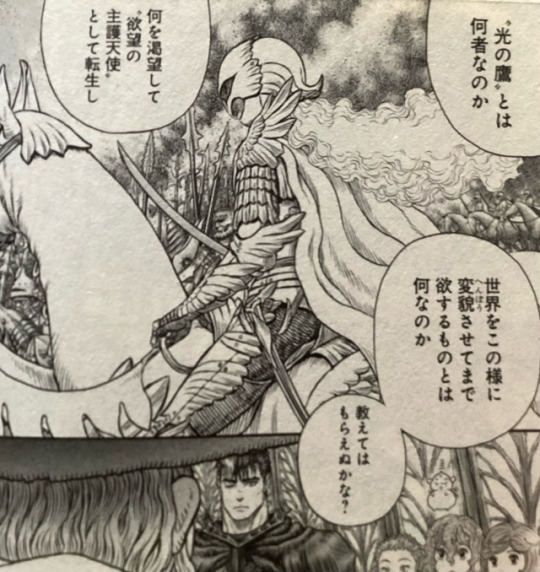
“光の鷹”とは 何者なのか [Who is the “Falcon of Light”?]
何を渇望して “欲望の 主護天使”として転生し [What did (he) yearn for and reincarnate as the "Guardian Angel of Desire"?]
世界をこの様に 変貌させてまで 欲するものとは 何なのか 教えては もらえぬかな? [Can you tell me what it is that (he) desire so much that (he) would change the world like this?]

On the other hand, in Guts’s mind the words are the following: やれやれ・・・ あいつ グリフィスへの 執着を振り切って ここまで 辿り着いた はずが・・・ [Yare yare… I thought I had made it this far by shaking off my attachment to (that guy) Griffith].
It’s a moment of reflection for Guts too. This is a page where you can feel how much Guts has been thinking about Griffith’s motivations, and everything else. Looking at the word 執着 (shuuchaku), the official translation went with “obsession” to convey that sense of strong “attachment”: Guts used to cling to Griffith to find a sense of purpose beyond pure survival and that hasn’t completely changed. The resources that Guts has are not infinite and that goes for his “tenacity” as well. Clinging to Griffith was easier than clinging to Casca as a source of motivation for fighting every night, if not for the help of the others he would have not succeeded. The sigil that Flora painted over the brand and that Schierke has kept at reapplying, in addition to the grounding power of Schierke’s presence against the counter effects of the Berserker Armor, the reprieve and shield against the nightmares and the evil spirits, the comfort of seeing Casca unafraid around Farnese and the others, all of it helped Guts and reaching Elfhelm had seemed like a diversion away from Griffith.
There are several different words that are interesting to me in this page. And for all the eroticism that the terms “longing” and “desire” suggest, there is something shifting from pure “thirst”, “craving”, “lust” and “greed” to a more metaphysical dimension because of the very inhuman-yet-reincarnated nature of Griffith. Something about this is still connected to Griffith’s “dreaming eyes”, to “ambition” in the sense of “aspirations”, “hopes” and “dreams”.
Elfheim teachers call Griffith 欲望の主護天使 Guardian Angel of Desire [which is the same of Berserk Volume 3 "Guardian Angel of Desire (5)"] while the God Hand salutes Griffith as 渇望の福王(よ) (Oh) Blessed King of Longing/Desire.
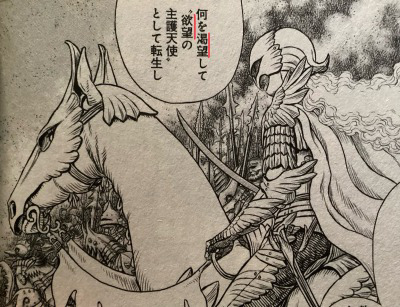
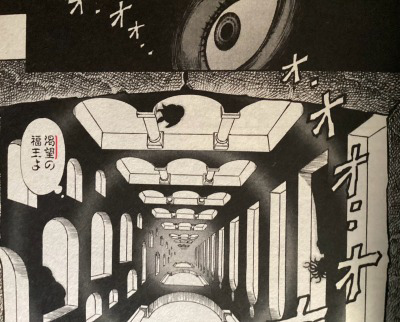
“Desire” as a noun in the instances above and as a verb or noun verb “longing” isn’t written in one same way depending upon who is addressing Griffith and what “title” he is addressed by. This use of different epithets in place of the person’s name (antonomasia) is interesting in itself, especially since Guts is one of the very few who is still calling him by his name with familiarity.
欲望 which is used above as a noun by the elders (Guardian Angel of Desire)
渇望 which is used above as a verb by the elders (what does he desire/yearn for?) and as a noun verb by the God Hand (Blessed King of Longing)

In both cases the kanji 望 is used that interest me here and that illustrates that dimension other than mundane that I mentioned. And for the specific detail of containing the kanji for full moon as well: as in previous posts I started to give examples of how much Griffith and Guts as characters are both tied to the moon.
Looking at the brief notes about etymology on Wiktionary:
Originally written 𦣠, an ideogrammic compound (會意 / 会意): 臣 (“eye”) + 𡈼 (“person standing on the ground”) – a person standing up and looking off into the distance. Later 月 (“moon”) was added to produce 朢. The 臣 component is now written 亡, making the current form a phono-semantic compound (形聲 / 形声, OC *maŋ, *maŋs): phonetic 亡 (OC *maŋ) + semantic 月 + semantic 𡈼.
It’s pretty amazing to read that. It’s not the first time I’ve mentioned one of my favorite chapters of Berserk "Homing" 帰巣, chapter 250 or 265 depending how you count and in that chapter Griffith is framed as exactly that: “a person standing up and looking off into the distance” and at the end of the chapter, when it’s night or later the moon is added as well and I have mused about it before, fascinated by the sense of isolation and at the same time longing for connection that the whole chapter communicates.

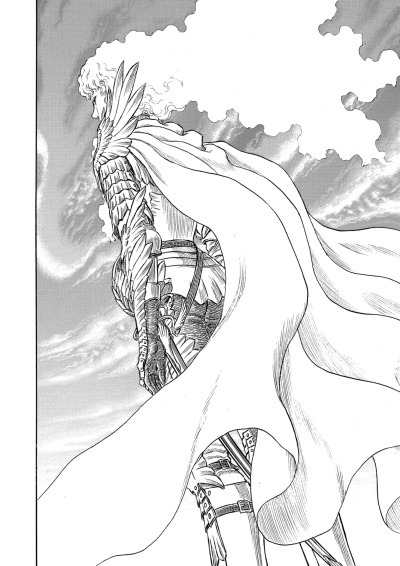

So why am I acting all pretentious and saying that my day started with me translating Japanese into German? Because there is a German word that evokes similar feelings that is quite impossible to translate and that is Sehnsucht.
While there is an erotic undertone in this kind of longing, it’s more tied to loss. But in other terms, the loss was inevitable, a too encompassing longing was a prophecy for unfulfillment because of how strong the tension of the desire was in a utopian and perfectionist direction: it could not be content with compromise, for something more important than a castle: if you touch me now… (now that I am weak, that I am no longer me).
#berserk#berserk meta#eri reads berserk#lost in translation#themes: moon#griffith#tight trope between perfectionism and nihilism#kentaro miura#sehnsucht
65 notes
·
View notes
Text

[Image above: Kyoto Sanzenin Temple, statue of Mahāsthāmaprāpta]
What is the 23 nights temple? [Part 1]
Thank you for your continued support of the ‘A Message from 23 Nights Temple’ blog. We have received quite a few questions from our readers about the ‘23 Nights Temple’, so we would like to answer them here in two parts.
23 nights is one of the folk rituals on the night of a specific moon phase, such as the 13th, 15th, 17th or 19th night, to wait for the moon to rise, make offerings, eat and drink together. Hundreds of years ago, halls where these events used to be held were scattered all over Japan, but unfortunately most of them have now been demolished and replaced by parking lots and modern ossuaries, especially in urban areas. The moon-waiting rituals of the Mid-Autumn Moon, 15 Nights (Full Moon), are still practised today. Although most modern Japanese are agnostics, some ritual events incorporating Buddhism and Shintoism remain.
The moon phase on the 23rd night is the ‘waning moon’, the half moon after the full moon, when the left half of the moon appears to be shining. The moon on the 23rd night is characterized by appearing late, around midnight, and in some mountainous areas surrounded by mountains, it can appear as late as 1 a.m.
In moon-waiting, the object of worship was determined by the time of the lunar phase at which the event was held. The object of worship on the 23rd night was Mahāsthāmaprāpta (bodhisattva mahāsattva), who was also said to be the incarnation of the moon. The light of wisdom possessed by Mahāsthāmaprāpta was thought to illuminate everything, freeing people from suffering and giving them strength.
In Shinto, Tsukuyomi-no-mikoto (Ref) is another name for Mahāsthāmaprāpta. He is also known as the god of agriculture and fishery, due to his characteristic control over the moon calendar.
The widespread ritual of waiting for the moon on the night of the 23rd lunar phase can be attributed to the worship of Mahastamaprapta, the savior of all things.
In “ A Message from 23 Nights Temple,” one of those shrines is featured. However, 2 years ago, the shrine, built over 1,000 years ago, was removed and converted into a commercial ossuary (August 2022), and the monk who left many of his messages died at the same time, but we continue to present the Zen words he left behind.
And personally, I am posting this not quite as a religion, but with the hope that as many people as possible will remember the philosophy of the prehistoric people, who lived with a sense of the cosmos, worshipping nature and enjoying the beauty of flowers, birds, wind and moon.

『二十三夜堂』とは何ですか?[その1]
日頃から『二十三夜堂からのメッセージ』ブログをご愛読いただきありがとうございます。読者のみなさんから『二十三夜堂』についてご質問が多々ありましたので、ここでお答えしようと思います。
二十三夜とは、十三夜、十五夜、十七夜、十九夜などの一つで、特定の月齢の夜に、人々が集まって月の出を待ち、供物を捧げ、飲食を共にする民俗儀式のこと。数百年前までは、こうした行事が行われるお堂が日本各地に点在していたが、残念ながら現在ではそのほとんどが取り壊され、特に都市部では駐車場や近代的な納骨堂に取って代わられている。中秋の名月、十五夜(満月)の月待ちの儀式は、今日でも行われている。現代の日本人の多くは無宗教だが、仏教や神道を取り入れた儀式行事も残っている。
二十三夜の月齢は、左側半分が輝いて見える「下弦の月」、満月の後の半月のこと。二十三夜の月は深夜0時ごろに現れるのが特徴で、山に囲まれた地域では深夜1時ごろに現れることもある。
月待ちでは、行事を行う月年齢の時期によって崇拝の対象が決まっていた。二十三夜で礼拝したのは、月の化身ともいわれた「勢至菩薩 (せいしぼさつ、梵: マハースターマプラープタ) 」である。勢至菩薩が持つ智慧の光は全てを照らし、人々を苦しみから解放して力を与えると考えられていた。その名は文字通り「大いなる力の到来」を意味する。
神道における「月読命(つくよみのみこと: 参照)」は、勢至菩薩の別名。暦を支配するという特徴から、農耕や漁業の神としても知られている。
二十三夜の月待ちが人々の間に広まった理由は、万物を救済する勢至菩薩を崇拝の対象にしていたからだといわれている。
『二十三夜堂からのメッセージ』では、それらの一つを取り上げています。しかし、2年前、1000年以上前に建てられた祠は取り払われ、商業的納骨堂へと改装され(2022年8月)、またメッセージの数々を残した僧侶も同時期に亡くなっていますが、彼の残した禅語を継続してご紹介しています。
そして個人的には、宗教というよりは、自然を崇拝し、花鳥風月を愛で、宇宙を感じて生きていた先史時代の人々の哲学を、一人でも多くの人に思い出してもらいたいという思いで投稿しています。
110 notes
·
View notes
Text
One Day - Lyrics + Translation

Please do not repost/retranslate without permission.
Kanji:
【All】 「おはよう」そして「おやすみ」を
生まれてきてくれて 有難う
これからもずっと傍に…
【Ei】 月にエスコートされて太陽は
【Sh】 空を目映く照らし出す
【Ki】 小鳥のさえずりを伴奏に
【Ei・Ki・Sh】 「いってらっしゃい」を愛で語ろう
【Ng】 街の賑やかさが
【Va】 高揚感を連れ出して
【Ng・Va】 今日も笑顔が咲いてゆく
【Ya】 後悔と反省は
【Ej】 暗くなる前に
【Ej・Ya】 手を繋ぎ合って
【Ng・Va】 希望と勇気に
【Ej・Ya】 変えてゆこうよ
【All】 幸せが「おかえり」って花ひらくから
【All】 一日の始まりから終わりまで
共に廻る 色とりどりの景色
どんな日々も (La la la)
一緒ならば (La la la)
いつだってアニバーサリー (アニバーサリー)
365日 そしてその先へ 丁寧に重ねてゆこう
【Ei】 四季折々のフェスティバルや
【Sh】 尊き誕生日はもちろん
【Ki】 ありふれた毎日の中さえ
【Ei・Ki・Sh】 奇跡は起こってゆくものだから
【Ng】 遊びだって 何だって
【Va】 手加減ナシの本気モード
【Ng・Va】 今日もついつい夜更かしさ
【Ya】 たまにするケンカは
【Ej】 信頼の証
【Ej・Ya】 喜怒哀楽が
【Ng・Va】 織り成していった
【Ej・Ya】 トクベツが ほら
【All】 日に日に かけがえのない場所になるんだ
【All】 うたた寝に温かなブランケット
揃いのカップ 涙に甘いカフェオレ
共に過ごす (La la la)
日常ぜんぶ (La la la)
羽ばたいたアニバーサリー (アニバーサリー)
365日 ひとつひとつから 愛を教わったんだよ
【Ei】 暁が高らかに 世界の
【Sh】 誕生に舞い 黎明は唄う
【Ki】 Morningの瑞々しさが育みを
【Ng】 Middayの輝きが 営みを
【Va】 黄昏は 喜び叫んでく
【Ya】 そしてオウマガトキ 抱きしめ合うように
【Ej】 互いを大切に想う 宵闇
【All】 空が移ろうたび 降り注ぐ祝福…
【All】 共鳴する夢と 感謝の歌を
最初からひとつだった魂
名前を付けよう (La la la)
この瞬間を (La la la)
美しきアニバーサリー (アニバーサリー)
365日 そしてその先へ 丁寧に重ねてゆこう
【All】 「おはよう」そして「おやすみ」を
命の限り 贈り続けよう
いつの日も「愛してる」を
Rōmaji:
【All】 “Ohayō” soshite “oyasumi” o
Umarete kite kurete arigatou
Korekara mo zutto soba ni…
【Ei】 Tsuki ni esukōto sarete taiyō wa
【Sh】 Sora o mabayuku terashi dasu
【Ki】 Kotori no saezuri o bansō ni
【Ei・Ki・Sh】 “Itterasshai” o ai de katarou
【Ng】 Machi no nigiyaka-sa ga
【Va】 Kōyōkan o tsuredashite
【Ng・Va】 Kyō mo egao ga saite yuku
【Ya】 Kōkai to hansei wa
【Ej】 Kuraku naru mae ni
【Ej・Ya】 Te o tsunagi atte
【Ng・Va】 Kibō to yūki ni
【Ej・Ya】 Kaete yukou yo
【All】 Shiawase ga “okaeri” tte hanahiraku kara
【All】 Ichinichi no hajimari kara owari made
Tomo ni meguru irotoridori no keshiki
Don’na hibi mo (La la la)
Issho naraba (La la la)
Itsu datte anibāsarī (anibāsarī)
Sanbyaku rokujū go nichi soshite sonosaki e teinei ni kasanete yukou
【Ei】 Shikioriori no fesutibaru ya
【Sh】 Tōtoki tanjōbi wa mochiron
【Ki】 Arifureta mainichi no naka sae
【Ei・Ki・Sh】 Kiseki wa okotte yuku mono dakara
【Ng】 Asobi datte nan datte
【Va】 Tekagen nashi no honki mōdo
【Ng・Va】 Kyō mo tsuitsui yofukashi sa
【Ya】 Tama ni suru kenka wa
【Ej】 Shinrai no akashi
【Ej・Ya】 Kidoairaku ga
【Ng・Va】 Orinashiteitta
【Ej・Ya】 Tokubetsu ga hora
【All】 Hinihini kakegae no nai basho ni naru nda
【All】 Utatane ni atatakana buranketto
Soroi no kappu namida ni amai kafeore
Tomo ni sugosu (La la la)
Nichijō zenbu (La la la)
Habataita anibāsarī (anibāsarī)
Sanbyaku rokujū go nichi hitotsuhitotsu kara ai o osowatta nda yo
【Ei】 Akatsuki ga takaraka ni sekai no
【Sh】 Tanjō ni mai reimei wa utau
【Ki】 Morning no mizumizushi-sa ga hagukumi o
【Ng】 Midday no kagayaki ga itonami o
【Va】 Tasogare wa yorokobi sakendeku
【Ya】 Soshite oumagatoki dakishime au yō ni
【Ej】 Tagai o taisetsu ni omou yoiyami
【All】 Sora ga utsurō tabi furisosogu shukufuku…
【All】 Kyōmei suru yume to kansha no uta o
Saisho kara hitotsu datta tamashī
Namae o tsukeyou (La la la)
Kono shunkan o (La la la)
utsukushiki anibāsarī (anibāsarī)
Sanbyaku rokujū go nichi soshite sonosakihe teinei ni kasanete yukou
【All】 “Ohayō” soshite “oyasumi” o
inochi no kagiri okuri tsudzukeyou
itsu no hi mo “aishiteru” o
Translation:
【All】 “Good morning” and “Good night”
Thank you for being born
Please stay by my side forever...
【Ei】 Escorted by the moon, the sun
【Sh】 Begins to dazzlingly illuminate the sky
【Ki】 Accompanied by the chirping of birds,
【Ei・Ki・Sh】 Let’s lovingly tell each other “See you later”
【Ng】 The bustle of the city
【Va】 Brings forth a feeling of exhilaration
【Ng・Va】 Today, too, smiles will blossom
【Ya】 Before it gets dark,
【Ej】 Let’s turn any
【Ej・Ya】 Regrets and remorse
【Ng・Va】 Into hope and courage
【Ej・Ya】 By holding hands
【All】 Because happiness blooms with a “Welcome home”
【All】 From the beginning to the end of each day,
We cycle together through a world of colorful scenes
No matter what kind of days may come, (La la la)
As long as we’re together, (La la la)
It’s always an anniversary (Anniversary)
365 days, and beyond — let’s carefully add to them one by one
【Ei】 Not just in the seasonal festivals
【Sh】 And precious birthdays, but even
【Ki】 Within our ordinary days,
【Ei・Ki・Sh】 Miracles are always happening
【Ng】 Whether we’re playing or doing anything else,
【Va】 It’s always serious and wholehearted, no holding back
【Ng・Va】 Today, we ended up staying up late again
【Ya】 The occasional argument
【Ej】 Is a sign of trust
【Ej・Ya】 Joy, anger, grief and pleasure
【Ng・Va】 Have woven together
【Ej・Ya】 Creating something special, you see
【All】 Day by day, it becomes an irreplaceable place
【All】 A warm blanket for a nap,
Matching cups, sweet café au lait for your tears
All the everyday moments (La la la)
We share (La la la)
Become a soaring anniversary (Anniversary)
From each of those 365 days, we’ve learned about love
【Ei】 Dawn rises high, celebrating the birth
【Sh】 Of the world and daybreak sings
【Ki】 Morning’s freshness nurtures,
【Ng】 The brightness of midday is alive
【Va】 And dusk shouts for joy
【Ya】 Then, by twilight, we hold each other close
【Ej】 We cherish each other deeply at midnight
【All】 Each time the sky changes, blessings rain down upon us…
【All】 A song of similar dreams and gratitude
From the start, our souls have been one
Let’s give a name (La la la)
To this moment (La la la)
A beautiful anniversary (Anniversary)
365 days, and beyond — let’s carefully add to them one by one
【All】 “Good morning” and “Good night”
For the rest of our lives, let’s keep exchanging these words
Everyday, let’s say “I love you”
#uta no prince sama#utapri#translation#english#he★vens#heavens#eiichi otori#kira sumeragi#nagi mikado#eiji otori#van kiryuin#yamato hyuga#shion amakusa#one day#lyrics
29 notes
·
View notes
Text
ドレス - Buck Tick (1993)
I doze with you in front of the mirror, my pale pink fingertips 鏡の前で君とまどろむ 薄紅の指先 That hand suddenly showed weakness and covered my lips. その手は不意に弱さを見せて 唇をふさいだ That day, I made a promise with you. あの日 君と約束を 交わした I can't remember the two of us now 今は二人 想��出せずに Listen to boring songs and stare out the window 退屈な歌に耳を傾け 窓の外見つめる
I'll wear a dress and dance to show you 僕はドレスをまとい 踊って見せよう
Tell me, are you crazy? 狂ってるかい 教えて
Someday it will be carried away by the wind いつか 風にさらわれてゆくだろう
I can't remember the two of us now 今は二人 想い出せず
Why am I like the wind and like the clouds? 僕はなぜ 風の様に雲の様に
Why are there no wings to float up to that sky? あの空へと浮かぶ羽がない なぜ
Wrap everything like the stars and the moon 星の様に月の様に全て包む
I have no wings to sink into that night, ah あの夜へと沈む羽がない ああ Don't forget those days full of love 忘れないで 愛あふれたあの日々
I can't even remember your face 君の顔も 想い出せずに
Someday it will be drowned out by the wind いつか 風にかき消されてゆくだろう
I can't remember the two of us now 今は二人 想い出せず
Why am I like the wind and like the clouds? 僕はなぜ 風の様に雲の様に
Why are there no wings to float up to that sky? あの空へと浮かぶ羽がない なぜ
Wrap everything like the stars and the moon 星の様に月の様に全て包む
I have no wings to sink into that night, ah あの夜へと沈む羽がない ああ
Why am I like the wind and like the clouds? 僕はなぜ 風の様に雲の様に
Why are there no wings to float up to that sky? あの空へと浮かぶ羽がない なぜ
I miss this love and this hurt この愛もこの傷も懐かしい
Now I'm in love and it hurts, ah 今は愛しくて痛みだす ああ
つづく ( To be continued... )
youtube
8 notes
·
View notes
Text













鏡の前で君とまどろむ 薄紅の指先 その手は不意に弱さを見せて 唇をふさいだ
あの日 君と約束を交わした 今は二人 想い出せずに
退屈な歌に耳を傾け 窓の外見つめる 僕はドレスをまとい 踊って見せよう 狂ってるかい 教えて
いつか 風にさらわれてゆくだろう 今は二人 想い出せず
僕はなぜ 風の様に雲の様に あの空へと浮かぶ羽がない なぜ 星の様に月の様に全て包む あの夜へと沈む羽がない ああ
聞かなくちゃ 早く 行かなくちゃ 早く







I dozed off with you in front of the mirror, with light crimson fingertipsYour hand suddenly shows me my weaknesses, and closes my lips
on that day, we made a promise to each other now, neither of us can remember it
I listen to a boring song, and stare out the window
You show me yourself dancing, and I follow your dress with my eyes; what are you aiming for? Tell me
One day, I'll probably be carried off by the wind...now, neither of us can remember it
Why am I not like the wind, like the mist; why are there no feathers that float up to the sky? Why am I not like the stars, like the moon, enveloped by everything; why are there no feathers that sink down into the night?
Don't forget those days that overflowed with love
I can't remember your face
One day, the wind will erase it
Now, neither of us can remember it
Why am I not like the wind, like the mist; why are there no feathers that float up to the sky? Why am I not like the stars, like the moon, enveloped by everything; why are there no feathers that sink down into the night?
Why am I not like the wind, like the mist; why are there no feathers that float up to the sky?
This love and these wounds are nostalgic; now they start to hurt with love, ah
(buck-tick, dress)
#girlblogging#blog#aesthetic#tumblr girls#aestehtic#aestheitcs#cute#witchblr#witchcraft#witches of tumblr#visual kei#buck tick#japanese art#japanese music#moodboard#beige messy moodboard#current mood#silly goofy mood#interesting#beige moodboard#pastel pink#pink aesthetic#pink#pinkcore#pink blog#pastel#pink moodboard#pastel aesthetic#light pink#glitter
30 notes
·
View notes
Text








Moon さよならを教えて
#buck tick#buck-tick#atsushi sakurai#sakurai atsushi#hisashi imai#toll yagami#hoshino hidehiko#higuchi yutaka#mine;#mine;gifs
66 notes
·
View notes
Text
Maomao(Gaoshun) no Hitorigoto Episode 28 “Bear Gall” / 猫猫(高順)のひとりごと 第28話 『熊胆(ゆうたん/Yutan)』
→Link to X
Please note that the English lines are just my translation.
高順「ただいま戻(もど)りました」
Gaoshun “Tadaima modori-mashita.”
Gaoshun “I’ve just returned.”
壬氏「高順。ご苦労(くろう)だった。…して、薬屋の方(ほう)はどうだった?」
Jinshi “Gaoshun. Gokuro datta. …Shite, kurusiyano-howa do-datta?”
Jinshi “Gaoshun, thank you for your hard work. So, how was Apothecary?”
高順「はい。今回(こんかい)の一件(いっけん)、鏡(かがみ)を使って抜(ぬ)け出(だ)したのではないかと。やはり、小猫は非常(ひじょう)に察(さっ)しがいいですね。こちらの事情(じじょう)も理解(りかい)している様子(ようす)でした」
Gaoshun “Hai. Konkaino ikken, kagami’o tsukatte nuke-dashitano-dewa naikato. Yahari, Shaomaowa hijoni sasshiga ii-desune. Kochirano jijomo rikai shite-iru yosu deshita.”
Gaoshun “Yes, regarding the subject, she said that they used the mirror to sneak out. As expected, Xiaomao is very perceptive. She seemed to understand the situation of our side.”
壬氏「鏡、か…。後(あと)で詳細(しょうさい)を教(おし)えてくれ」
Jinshi “Kagami, ka… Atode shosai’o oshiete-kure.”
Jinshi “A mirror… Tell me the details later.”
高順「御意(ぎょい)。では、私(わたし)はこれで」
Gaoshun “Gyoi. Dewa, watashiwa korede.”
Gaoshun “Understood. Then, I’m taking my leave.”
壬氏「ちょっ、ちょっと待(ま)ってくれ」
Jinshi “Cho, Chotto matte-kure.”
Jinshi “W-Wait a minute.”
高順「いかがされましたか?」
Gaoshun “Ikaga sare-mashitaka?”
Gaoshun “What’s the matter with you?”
壬氏「まだ報告(ほうこく)が終(お)わっていないぞ」
Jinshi “Mada hokokuga owatte-inaizo.”
Jinshi “The report isn’t finished yet.”
高順「ん?手習(てなら)い所(じょ)の工事(こうじ)でしたら、滞(とどこお)りなく」
Gaoshun “N? Tenaraijono koji deshitara, todokoori-naku.”
Gaoshun “Hmm? If it’s construction work for the penmanship school, it’s been going smoothly.”
壬氏「違(ちが)う!」
Jinshi “Chigau!”
Jinshi “It’s not that!”
高順「ん?毒茸(どくきのこ)は全(すべ)て���取(さいしゅ)し…」
Gaoshun “N? Doku-kinokowa subete saishu-shi…”
Gaoshun “Hmm? We’ve picked all the poisonous mushrooms…”
壬氏「それも違う!あの…熊胆(ゆうたん)とかいう代物(しろもの)はどうだった?」
Jinshi “Soremo chigau! Ano…yutan-toka-iu shiro-mono-wa do-datta?”
Jinshi “It’s not that, either! What about that thing…called bear gall?”
高順「なるほど。ここで、高順の豆知識(まめちしき)。熊胆は、胃(い)のもたれや胃痛(いつう)、胸(むね)やけにも効果(こうか)があり、驚(おどろ)くべきはその即効性(そっこうせい)にある。胃のむかつき程度(ていど)であれば寸刻(すんこく)の内(うち)…」
Gaoshun “Naruhodo. Kokode, Gaoshun’no mame-chishiki. Yutanwa, ino motareya itsu, mune-yake-nimo kokaga ari, odoroku-bekiwa sono sokko-sei-ni aru. Ino mukatsuki-teidode areba sun-koku-no uchi…”
Gaoshun “I see. Here’s Gaoshun’s bits of knowledge. Bear gall is effective for stomach upset, stomach pain, and heartburn as well. What’s surprising is how quickly it works. If it’s just an upset stomach, it’ll be gone in an instant…”
壬氏「ちっが―――う!」
Jinshi “Chiggaaaaaaau!”
Jinshi “It’s nooooot that!”
I really like how Mr. Otsuka (VA) spoke this line!
高順「私が覚(おぼ)(おぼ)えてしまうほど、熊胆がいかに優(すぐ)(すぐ)れた生薬(しょうやく))(であるかを何度(なんど)(なんど)も教(おし))((おし)えていただきました」
Gaoshun “Watashiga oboete-shimau-hodo, yutanga ikani sugureta shoyakude aruka’o nandomo oshiete itadaki-mashita.”
Gaoshun “She told me so many times how excellent bear gall was that I’ve memorized it.”
いかに(Ikani) = formal word which means どんなに(Donnani): how
壬氏「それはつまり…」
Jinshi “Sorewa tsumari…”
Jinshi “That means…”
高順「大変(たいへん)、喜(よろこ)ばれていらっしゃいました」
Gaoshun “Taihen, yoroko-barete irasshai-mashita.”
Gaoshun “She was very happy.”
喜ばれていらっしゃいました: I think this sentence is not exactly correct, called “double honorific.”
喜んでいた is the simple form, and either “喜んで” or “いた” should be changed to be honorific, not both. So, “喜んでいらっしゃいました” or “お喜びでした” or “喜ばれていました” is better.
壬氏「そうか。ご苦労だった。(♪鼻歌(はなうた))」
Jinshi “Soka. Gokuro datta. (♪Hana-uta)”
Jinshi “I see. Thank you for your hard work. (♪Humming)”
高順「まったく…。手(て)のかかるお方(かた)だ。次回(じかい)、『月精(げっせい)』。国(くに)の安寧(あんねい)を揺(ゆ)るがす美女(びじょ)…ご覧(らん)いただきましょう」
Gaoshun “Mattaku… Teno kakaru okatada. Jikai, ‘Gessei.’ Kunino an’nei’o yurugasu bijo… goran itadaki-masho.”
Gaoshun “Seriously… he’s such a high-maintenance person. Next episode, ‘Moon Fairy.’ Please take a look at…the beautiful woman who threatens the peace of the nation.”
手のかかる(てのかかる/Teno kakaru): troublesome, high-maintenance, need a lot of care
Synonyms : 手がかかる、手間(てま)がかかる、世話(せわ)の焼(や)ける、世話が焼ける
The words are usually used to express babies’ or kids’ status, and in this case it’s a complaint with a warm atmosphere of love for Jinshi.
#apothecary english#apothecary romaji#the apothecary diaries#apothecary diaries#learning japanese#japanese#薬屋のひとりごと#薬屋のひとりごと 英語#薬屋 英語 学習#japan#KNH#Gaoshun no Hitorigoto#maomao no hitorigoto
12 notes
·
View notes
Text
前夜祭の行進
Parade on the Eve
沈んでいった夕日に右手を振り
I wave my right hand goodbye at the setting evening sun
左手でお月様に挨拶
I wave my left hand hello at the moon
お祭りの夜に今夜限りの
On this night of celebration, how about
幼いパレードを引き連れ行こうか
We take along the childish parade that's just for tonight?
.
練り歩く子供の列の前で
At the head of the line of marching children,
お祭りの秘密をささやくのさ
I'll whisper the secret of this festival
差し出す右手→隠す左手
With right hand outstretched-->left hand hidden
魔法の言葉を教えてあげるよ
I'll teach you the magic words
守るべきことも約束も
And these rules you ought to abide, these promises,
魔法の言葉が溶かすよ
The magic words will melt them away
.
Happy HalloweeN
Have a good nightmarE
.
行き先矢印は案山子の枯れた手
The arrow pointing the way is a scarecrow's withered hand
回るバケツの頭を飛び越えたら
Once you leap clear over its swiveling bucket head,
素知らぬ顔で子供の列に並び歌う
Playing innocent, the line of children gathers together and sings
お菓子な今夜だけの魔法を
Of the magic that's just for tonight, this curious[1] night
.
trick or treat!
ドアを叩いてまわろう
Let's go around knocking on doors
今夜はお祭りの夜だ
Tonight's the festival night
give me something sweets,hurry!
.
三回目のノックと
With three knocks and
一度きりの魔法
Just one spell
if you open doors of your mind
.
僕も君もお前もお菓子な色に染まって
Me, you, and you are dyed in a curious color
行き先も答えもこの掌の中に
Our destination, the answer, they're here in my grasp
差し出した右手にお菓子を強請り
With my outstretched right hand I press for candy
背中に隠す左手
And hide my left behind my back
.
僕も君もお前もお菓子な色に染まって
Me, you, and you are dyed in a curious color
お祭りの夜を飾る奇怪になろうか
Shall we become a mystery that adorns this festival night?
差し出した右手で手招くフリ
While I pretend to beckon with my right hand outstretched
背中に隠す左手は
The left hand hidden behind my back--
.
家路の矢印は黒猫のカギの尻尾
The arrow pointing home is the hook of a black cat's tail
空色目玉をくり貫いたら
Once you gouge out their sky-blue eyes
訳知り顔で子供の列を外れ歌う
Playing smug, the line of children scatters and sings
お菓子な今夜だけの魔法を
Of the magic that's just for tonight, this curious night
.
trick or treat!
ドアを叩いて回ろう
Let's go around knocking on doors
もうすぐお祭りは終わる
The festival will end soon
give me something sweets,hurry!
.
いびつなポケットと
A warped pocket
無邪気な行進
And an innocent parade
if you open doors of your mind
.
僕も君もお前も一緒に行こう パレード!
Let's me and you and you all go together on a parade!
甘いお菓子も言葉も脅し取ろうじゃないか
How about we go extort some sweet candy and words?
迷子にならぬようについておいで
Come along with me so you won't get lost
怖くて愉快な魔法を
In this scary and delightful magic
.
僕も君もお前もお菓子な色に染まって
Me, you, and you are dyed in a curious color
お祭りの夜を飾る奇怪になろうか
Shall we become a mystery that adorns this festival night?
差し出した右手で手招くフリ
While I pretend to beckon with my right hand outstretched,
背中に隠す左手に
In my left hidden behind my back is
ナイフとフォークとひとさじの悪夢
A knife and fork and a spoonful of a nightmare
.
1)The song consistently uses the word for "strange", but the kanji for "candy". I'm afraid I don't know a way to preserve this pun in English.
6 notes
·
View notes
Text
『12月19日 New Album「青い鳥」リリース決定のお知らせ』

湯川潮音の 2 年ぶりとなる新作アルバム「青い鳥」が今冬にリリースされる。
2022 年に発表された前作「10 の足跡」と対になるような本作は、前作と同様にセルフプロデュースという形で制作された。
小説や短歌から得た着想を横糸に、時の流れと共に彼女が見つめてきた
「産まれること・生きること・去っていくこと」を縦糸に織り上げられた歌詞が、ルーツである合唱曲、宗教曲からトラディショナルソングを真摯に取り入れた
オリジナルサウンドに導かれ、一つの物語として見事に昇華されている。
アレンジャーに藤原マヒト、桜井芳樹、ストリングスアレンジャーには高原久実といった彼女と長年音楽を共有し、描く世界を熟知する面々が参加している。
また、実父である湯川トーベン氏との初の共作曲も収録。色彩豊かな楽曲群が並ぶこのアルバムは、
デビューから 20 年の時を経た湯川潮音の、これまでの集大成とも言える一枚だろう。
///////////////////////////////////////////////////////////////////////////////////////
発売日の 12 月 19 日、 人生の真ん中くらいの場所に立ち ( 誕生日 ) 幼少期の記憶から、 年を重ねたもっと先の景色へと 思いを馳せながらつくっていきました。
「はじまり」と「おわり」 「生きること」「生を終えるということ」 「この世界」と「あの世と呼ばれる世界」
いろいろな狭間を想像しながら、 あっちへいったり こっちへいったりと旅をしながら、、、
この「青い鳥」が何色にみえるのかは いまも この先も きっと ずっと 変わっていくものなんだと思います。
湯川潮音
New Album「青い鳥」先行販売はこちらから!
【先行販売は特典マグネット付き、国内は送料無料にてお送りいたします】
2024.12.19 Release
湯川潮音 "青い鳥"
定価: 3,300円(税込/10曲入)
1. きおくの海
2. 1986
3. Last Waltz
4. ひとりになりたい
5. ジプシー
6. 旅立つ日には
7. 青い鳥
8. Full Moon
9. リリアン
10. 憧れの人
[ 参加ミュージシャン]
藤原マヒト、桜井芳樹、原さとし、関島岳郎、高原久実、山本楓、原元由紀、川口義之、佐藤綾音、吉野友加、湯川トーベン、田村玄一、千ヶ崎学、猪爪東風 、武末亮
All songs Written & Composed by 湯川潮音
Except M10 Composed by 湯川トーベン
All songs Arranged by 藤原マヒト
Except M5 Arranged by 桜井芳樹
Except M2,M6 Strings Arranged by 高原久実
Recorded, Mixed & Mastered by 猪爪東風 at 日野音楽室第III
Photography by 東野翠れん
Art Direction & Design by 中島基文
Hair & Make up by 森愛
2 notes
·
View notes
Text
genuinely get into this right now
2 notes
·
View notes
Text

Legends and myths about trees
Celtic beliefs in trees (27)
A for Ailm (Pine) - December 23rd Birth of the Divine child
“The birth of the King of the Flourishing Half Year - The Celtic Tree Calendar”
Stars: Mars & Sun; Gender: female; Metal: gold; Patrons: Artemis, Ariadne, Rhea, Cybele, Druantia, Dionysus, Bacchus; Symbols: foresight, purity, objectivity, birth
The Ogham alphabet has 5 vowels. The number 5 is the sacred number of the 'White Goddess'. Like all five vowel trees, pine is a female tree. And it is also the first vowel A, the tree of birth.
In ancient Greece, the pine tree was the goddess of the moon and dedicated to Artemis, who was responsible for the birth of children.The birth of Christ is celebrated on 25 December, and the Christmas tree decorated on this day is Norway spruce. The spruce is a member of the pine tree family. Although Christ's birthday is now celebrated on 25 December, it is believed that in earlier times our ancestors celebrated the birth of the Son of God on 23 December.
23 December marked the beginning of the 'Half Year of Light' and the birth of the "Son of God, the King of the Flourishing Half Year", and a gift of the wisdom of our ancestors.
On the winter solstice, druids (Ref2) in Europe lit large bonfires of pine and yew. Around the same time, the festival of the Druid Queen, Druantia, also took place. These large bonfires, which were built on the winter solstice, were passed on to the Yule Log. While the Yule festival lasted, people lit candles on pine trees and decorated them with glittering objects. The Christmas tree is the successor to this custom.

The ancients believed that the pine cones were cleverly guided by magical powers, as they spiralled and followed the same clockwise direction on their trunks as the earth around the sun. Yellow pollen was utilised in the 'money-accumulation spell' as yellow attracts gold. Pine branches are said to prevent evil from entering the house if hung over doors and windows, and old people are said to be rejuvenated if they carry pine cones.
Futhermore, Native Americans put a bag full of pine needles under their pillows on the floor when they have insomnia. In ancient Egypt, doctors in the Pharaoh's service used pine tar and turpentine oil to treat pneumonia.
The ancients learnt from the towering pines the importance of looking at things objectively and from a broad perspective. Pine teaches that you have to be positive about things, correct mistakes immediately and chase responsibility yourself.
So, have a happy Christmas everyone, surrounded by the tree again this year.

木にまつわる伝説・神話
ケルト人の樹木の信仰 (27)
AはAilm (マツ) - 12月23日 神の子の誕生、ケルトの木の暦(参照)
星: 火星&太陽、性: 女性、金属: 金、守護神: アルテミス、アリアドネ、レア、キュベレ、ドルアンティア、ディオニックス、バッカス、シンボル: 先見の明、清浄、客観性、誕生
オガム文字には5つの母音がある。数字の5は「白い女神」の聖なる数字。5つの母音のすべての木がそうであるように、マツも女性の木、そして最初の母音のA、誕生の木でもある。
古代ギリシャでは、マツは月の女神で、子供の誕生をつかさどるアルテミスに捧げられた。キリストの誕生を祝う12月25日、この日に飾るクリスマス・ツリーはノルウェートウヒ。トウヒはマツ科の木である。現在、キリストの誕生日は12月25日とされているが、その昔、祖先は12月23日に神の御子の誕生を祝っていたとされる。12月23日は「光の半年間」の幕開けと「神の子・盛りゆく半年の王」の誕生を一緒の祝う先祖の知恵の産物であった。
冬至の日、ヨーロッパのドルイド(参照2)は松やイチイの大きな焚き火をした。これは、太陽神を冥界から呼び戻し、この世に再生させるためであった。ユール祭が続く間、人々はマツの木に蝋燭を灯したり、きらきら光るものを飾ったりした。それは、生命の源である太陽神の聖なる光を守るためであった。また、その光は暗い冬の間も常緑樹の植物に蓄えられると古代人は信じていたからだ。その習慣を受け継いだのがクリスマスツリーである。
松ぼっくりは、螺旋を描きながら、太陽の周りをめぐる地球と同じように時計回りに幹につくため、魔法の力を巧みに導く存在であると、古代人は信じていた。黄色い花粉は黄色がゴールドを引き寄せるとして「お金がたまる呪い」に活用された。マツの枝はドアや窓にかけると邪悪なものが家の中に侵入できなくなり、老人は松ぼっくりを持ち歩くとして若返ると言われている。
さらに、ネイティブ・アメリカンは不眠症のとき、マツの葉が詰めた袋を枕の下に敷いて床につく。古代エジプトでは、ファラオに仕える医者が肺炎の治療に松脂とテレビン油を使ったという。
古代人は広い視野に立って客観的、長期的にものを見る重要性を、高くそびえる松に学んできた。物事には前向きに取り組み、過ちはすぐに正し、責任は自分で追わなければならないと、マツは教えている。
さあ、今年もまたツリーにかこまれて、みなさん楽しいクリスマスをお過ごしください。
#trees#tree myth#tree legend#folklore#celtic tree calendar#celtic belief#mythology#legend folklore#pine trees#nature#art
97 notes
·
View notes
